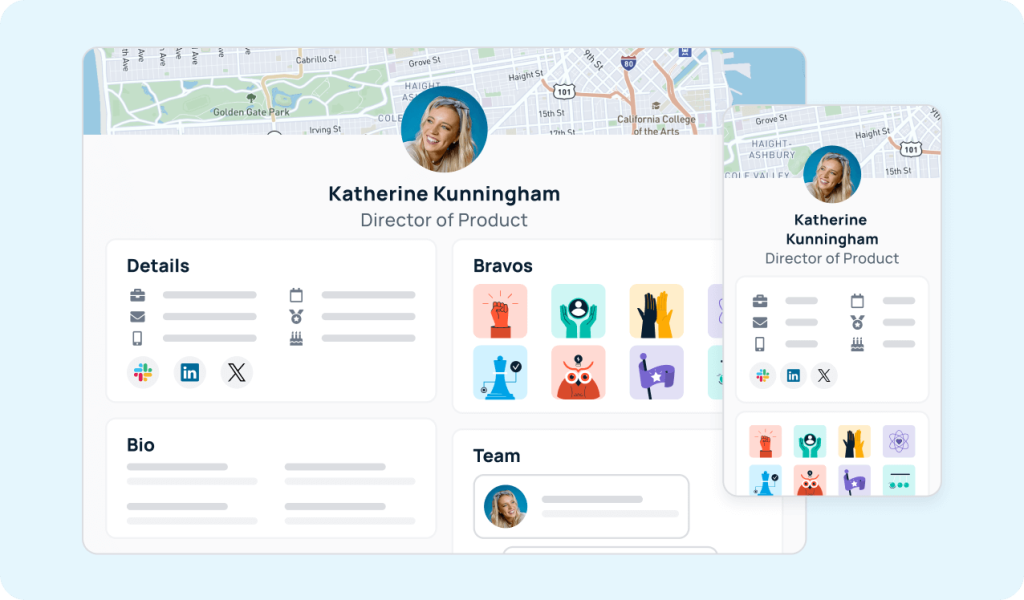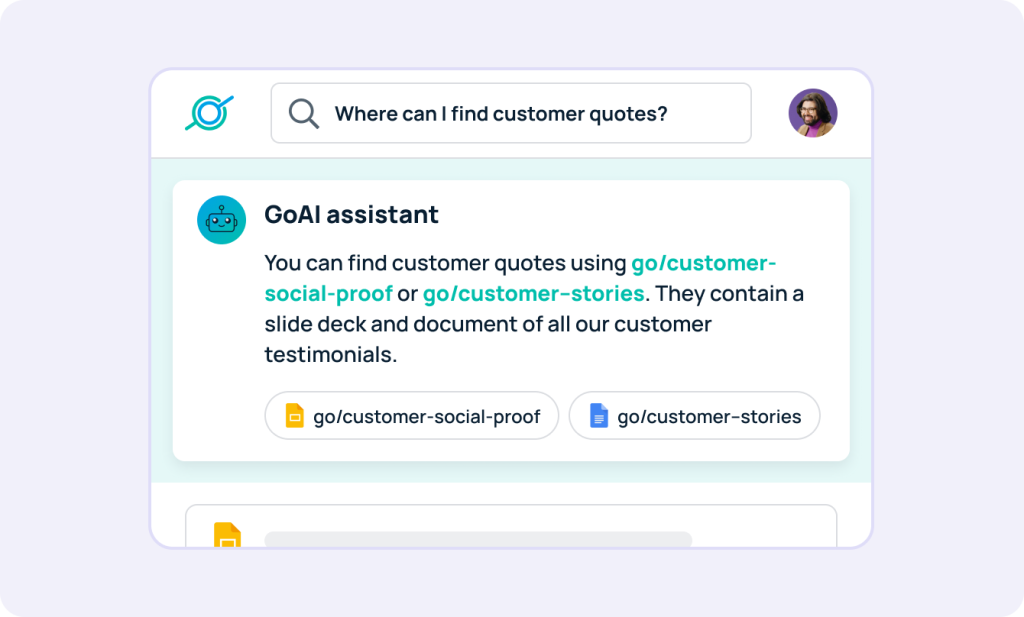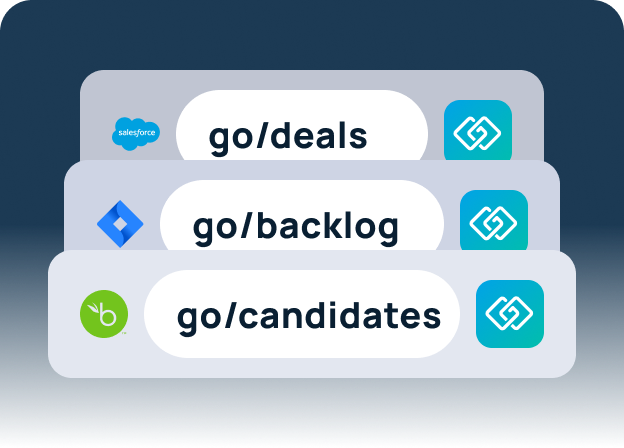The enterprise apps market is expected to grow to 334 billion by 2025. As more business operations shift online to reduce manual efforts and enhance data analysis, the demand for enterprise software solutions has skyrocketed.
Enterprise apps play a critical role in managing business operations, project management, customer relationship management (CRM), and data management at scale.
If your company is facing issues like inefficient workflows, scattered data, or interrupted team communication, these enterprise apps will help boost productivity and streamline your business processes.
Let’s dive into some of the top tools, plus newer AI tools, that can support your business going into 2025.
12 enterprise applications for 2025
1. GoLinks
GoLinks provides a more efficient way to share and access internal resources. By transforming long, complicated URLs into short, human-readable go links, companies can streamline how team members access shared resources. With real-time analytics, businesses can gain insights into how often GoLinks are used, helping optimize their resources.

Key features:
- Human-readable short links
- Centralized link dashboard
- Security and compliance controls
- Analytics to monitor usage
- Easy user experience
Best for:
- Teams managing multiple cloud-based apps
- Enterprises that need a single source of truth for resources
2. Jira
Jira remains one of the most powerful project management tools, especially for enterprises using agile methodologies. It’s highly customizable, offering advanced features for issue tracking and linking related tasks. Teams can leverage its AI-driven automation for tasks like ticket assignments and workflow streamlining.
Key features:
- AI-powered automation for project management
- Scrum and Kanban boards
- Advanced issue management
- Integration with CI/CD pipelines
Best for:
- Large-scale software development teams
- Enterprises using agile or hybrid methodologies
3. GoProfiles
GoProfiles helps enterprises manage employee data and improve internal communication by offering detailed employee profiles and a dynamic org chart. With the integration of AI-powered team insights, the platform also facilitates automated peer recognition, enhancing employee engagement and overall team member productivity.

Key features:
- AI-driven employee insights
- Interactive company org chart
- Employee recognition & rewards
- Seamless integration with tools like Workday and ADP
Best for:
- Remote teams and enterprises scaling their operations
- Companies prioritizing employee engagement
4. GoSearch
GoSearch is an AI-powered enterprise search tool that consolidates data from various sources to provide precise and comprehensive search results. By integrating AI to understand natural language processing, GoSearch helps employees quickly find relevant data across a multitude of enterprise software solutions, thus reducing time spent searching and improving overall productivity.

Key features:
- AI-driven search capabilities
- Search across all enterprise tools, including CRM, ERP, and internal databases
- AI workplace assistant chatbot
- Custom GPTs
- Multimodal AI with image uploads and URL summaries
- Security and compliance for enterprise-grade searches
Best for:
- Data management across large enterprises
- Teams needing quick access to dispersed data
5. Clockify
Clockify is a time-tracking tool that enables enterprises to monitor and improve productivity. The app offers deep insights into how employees and teams spend their time, helping businesses optimize resource allocation. For customer service teams, Clockify’s tracking features ensure that resources are spent wisely to maximize customer satisfaction.
Key features:
- Real-time time tracking and reporting
- Project and task management
- Visual time reports
Best for:
- Teams that serve clients or contractors
- Enterprises looking to improve time management
6. Notion AI
Notion AI is a versatile productivity tool that uses artificial intelligence to assist with knowledge management, content creation, and real-time collaboration. Whether creating project documentation, drafting customer support responses, or organizing team workflows, AI tools within Notion streamline work processes and automate repetitive tasks.
Key features:
- AI-based task management
- Collaborative document creation
- Project and content planning
Best for:
- Teams with complex documentation needs
- Businesses looking to improve project management
7. monday.com
monday.com stands out as a project management tool that enhances collaboration and resource planning. By using AI-driven workflow automations, teams can reduce manual labor, focus on high-value tasks, and increase overall productivity. Its intuitive interface supports both enterprise resource planning (ERP) and CRM functionalities.
Key features:
- Automated workflows powered by AI
- Task and project management dashboards
- Customizable workflows for cross-functional teams
Best for:
- Interdisciplinary teams and enterprise-level companies
- Teams managing contractors or clients
8. Trainual
Trainual allows enterprises to document business operations, create standard operating procedures (SOPs), and build employee training modules. As an AI-enabled platform, it offers personalized training recommendations based on employee performance, ensuring consistency in skills across the organization.
Key features:
- SOP creation and sharing
- AI-generated training paths
- Onboarding and team training
Best for:
- Companies with frequent onboarding
- Teams with structured training processes
9. Front
Front consolidates customer communication into one platform, helping customer service and support teams manage emails, chat, and social media messages efficiently. The tool uses AI-powered automations to route messages, suggest responses, and manage workflows, which enhances customer satisfaction and team productivity.
Key features:
- Centralized inbox for all communication channels
- AI-driven automations for message routing and responses
- Workflow management
Best for:
- Customer service and support teams
- Companies with high volumes of customer interactions
10. Smartsheet
Smartsheet is a project management solution and enterprise resource planning (ERP). Its AI-driven workflow automations allow enterprises to track, manage, and report on projects more effectively. By integrating with other business applications, it supports resource allocation, budgeting, and collaboration.
Key features:
- AI-enhanced workflow automation
- Project planning and resource management
- Time tracking and team reporting
Best for:
- Enterprises managing complex projects across multiple departments
- Teams needing real-time project insights
11. Trello AI
Trello, widely known for its visual project management interface, now integrates AI-powered task automations and predictive analytics. Its AI features enhance task prioritization and workflow optimization, making it easier for enterprises to stay organized and manage their projects more efficiently.
Key Features:
- AI-driven task automation
- Predictive task prioritization
- Integration with hundreds of business apps
Best for:
- Enterprises needing visual project management
- Teams focusing on task automation and data-driven insights
Improve your work processes with GoLinks
Enterprise apps are essential for companies looking to streamline business operations and improve productivity. With tools like GoLinks, enterprises can access and share information faster than ever before.
Access and share resources instantly with GoLinks
Try for free














